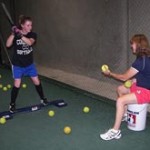Monkey
see, monkey do. We have all heard this saying, and when we
have children, we understand the saying.
What we don’t tend to take into account is the impact we have as adults in
the simple four-word phrase. Every
action we commit
, every word we say, children pay attention; they are sponges
and they absorb the things we do and say and can mimic us at any given moment. The same applies in athletics.
If you do not look like you know
what you are doing, you won’t get the respect that you seek from your
athletes. Female athletes
are extremely
observant. The first things we notice
about people are their outward appearance
and mannerisms. If you lack athleticism, if you can’t do a
drill with ease or perfection, why should you expect your athlete to perform
that way? Before you demand an action,
figure out if you can do it first, or at least look like you can do it. Your female
athletes will not only appreciate
that you can do what you teach them, but they will trust you and what you are
doing.
The majority of male coaches have
never played softball, but baseball
.
Being so, they have a tendency of thinking both sports are taught the
same. Softball and baseball are worlds
apart not only because they are different games, but because males and females
are so different. Nine times out of ten,
a baseball skill won’t be effective when performed by a female athlete. Our body strengths and mentality towards the
game differ from a males; something so simple in male athletics can seem like
rocket science to female athletics, and vice versa. Being so, it is best for coaches to learn
softball skills, as well as a softball
mentality, to better relate to their
athletes.
There are many ways you can learn
softball skills and drills
for female athletes; you can read online, go to
classes, attend coaching seminars, all of which great. The best way for you to retain all of this is
to watch yourself perform the drills yourself.
Think about all the things you have your athletes do at practice then do
them in the mirror. This is the best way
to see yourself do the drill and analyze what you are doing correctly, and what
you need to fix. Once you perfect the
drill, you can successfully demonstrate to your athletes. When you look like you know what you are
doing, not only will your athletes respect
you, but parents and other coaches
alike as well. The more, well-rounded
every member looks on your team, including the coach, the more respected they will
be on the ball field.
Key Facts about Looking Like a Softball Coach
- Know how to perform what you ask of your athletes
- Take time to learn softball skills and drills
- Watch yourself perform softball drills in the mirror until you can do the drill yourself, or at least look like you know what you are doing









 All American Softball School
All American Softball School California College Prep
California College Prep Mizuno All American
Mizuno All American


Recent Comments